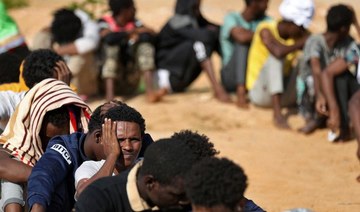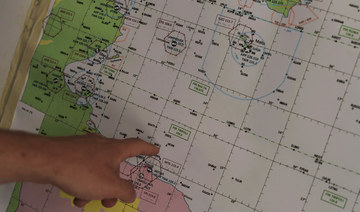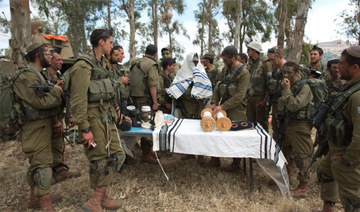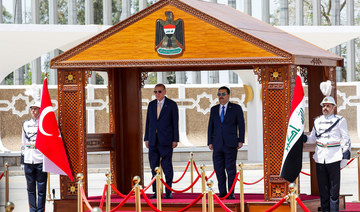VATICAN CITY: Pope Francis on Sunday made an impassioned plea to end the practice of returning migrants rescued at sea to Libya and other unsafe countries where they suffer “inhumane violence.”
Francis also waded into a highly contentious political debate in Europe, calling on the international community to find concrete ways to manage the “migratory flows” in the Mediterranean.
“I express my closeness to the thousands of migrants, refugees and others in need of protection in Libya,” Francis said. ”I never forget you, I hear your cries and I pray for you.”
Even as the pontiff appealed for changes of migrant policy and of heart in his remarks to the public in St. Peter’s Square, hundreds of migrants were either at sea in the central Mediterranean awaiting a port after rescue or recently coming ashore in Sicily or the Italian mainland after setting sail from Libya or Turkey, according to authorities.
“So many of these men, women and children are subject to inhumane violence,” he added. ”Yet again I ask the international community to keep the promises to search for common, concrete and lasting solutions to manage the migratory flows in Libya and in all the Mediterranean.”
“How they suffer, those who are sent back” after rescue at sea, the pope said. Detention facilities in Libya, he said “are true concentration camps.”
“We need to stop sending back (migrants) to unsafe countries and to give priority to the saving of human lives at sea with protocols of rescue and predictable disembarking, to guarantee them dignified conditions of life, alternatives to detention, regular paths of migration and access to asylum procedures,” Francis said.
UN refugee agency officials and human rights organizations have long denounced the conditions of detention centers for migrants in Libya, citing practices of beatings, rape and other forms of torture and insufficient food. Migrants endure weeks and months of those conditions, awaiting passage in unseaworthy rubber dinghies or rickety fishing boats arranged by human traffickers.
Hours after the pope’s appeal, the humanitarian organization Doctors Without Borders said that its rescue ship, Geo Barents, reached a rubber boat that was taking on water, with the sea buffeted by strong winds and waves up to three meters (10 feet) high. It tweeted that “we managed to rescue all the 71 people on board.”
The group thanked the charity group Alarm Phone for signaling that the boat crowded with migrants was in distressed.
Earlier, Geo Barents, then with 296 migrants aboard its rescue ship, was awaiting permission in waters off Malta to disembark. Six migrants tested positive for COVID-19, but because of the crowded conditions aboard, it was difficult to keep them sufficiently distant from the others, Doctors Without Borders said.
In Sicily, a ship operated by the German charity Sea-Watch, with 406 rescued migrants aboard, was granted permission to enter port. But Sea-Watch said that a rescue vessel operated by a Spanish charity, with 105 migrants aboard, has been awaiting a port assignment to disembark them for four days.
While hundreds of thousands of migrants have departed in traffickers’ boats for European shores in recent years and set foot on Sicily or nearby Italian islands, many reach the Italian mainland.
Red Cross officials in Roccella Ionica, a town on the coast of the “toe” of the Italian peninsula said on Sunday that about 700 migrants, some of them from Afghanistan, reached the Calabrian coast in recent days on boats that apparently departed from Turkey.
Authorities said so far this year, about 3,400 migrants had reached Roccella Ionica, a town of 6,000 people, compared to 480 in all of 2019. The migrants who arrived in the last several days were being housed in tent shelters, RAI state television said.
Italy and Malta have come under criticism by human rights advocates for leaving migrants aboard crowded rescue boats before assigning them a safe port.
The Libyan coast guard, which has been trained and equipped by Italy, has also been criticized for rescuing migrants in Libyan waters and then returning them to land where the detention centers awaited them.
On Friday, Doctors Without Borders tweeted that crew aboard the Geo Barents had “witnessed an interception” by the Libyan coast guard and that the migrants “”will be forcibly taken to dangerous detention facilities and exposed to violence and exploitation.”
With rising popularity of right-wing, anti-migrant parties in Italy in recent years, the Italian government has been under increasing domestic political pressure to crack down on illegal immigration.
Italy and Malta have lobbied theirs European Union partner countries, mainly in vain, to take in some of those rescued at sea.
Pope: Don’t send migrants back to Libya and ‘inhumane’ camps
https://arab.news/n4yj3
Pope: Don’t send migrants back to Libya and ‘inhumane’ camps

Hezbollah denies Israel claim it killed half of commanders in south
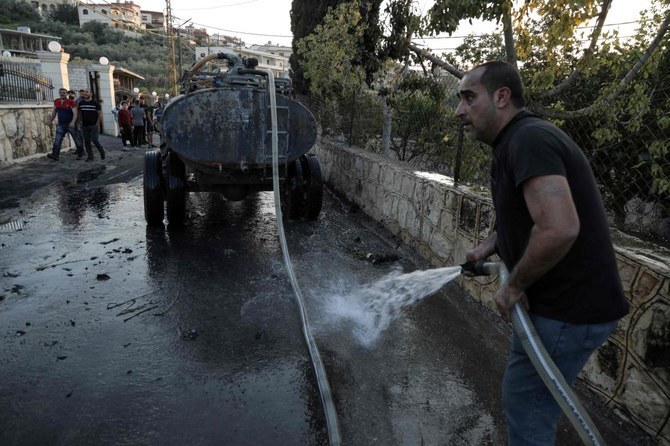
- The number of slain Hezbollah members who “hold a certain level of responsibility does not exceed the number of fingers on one hand“
- Gallant’s claim was “untrue and baseless”
BEIRUT: Hezbollah denied on Thursday an Israeli claim that it had killed half of the Iran-backed Lebanese group’s commanders in the south of the country, saying only a handful were slain.
The Lebanese group has been exchanging near-daily fire with the Israeli army since the day after its Palestinian ally Hamas carried out an unprecedented attack on Israel on October 7.
Israel’s Defense Minister Yoav Gallant said on Wednesday that “half of Hezbollah’s commanders in southern Lebanon have been eliminated” in the months of cross-border violence sparked by the Israel-Hamas war in Gaza.
“The other half are in hiding and abandoning the field to IDF (Israeli army) operations,” he added, without specifying how many.
A Hezbollah source who spoke on condition of anonymity rejected the claim.
The source told AFP that the number of slain Hezbollah members who “hold a certain level of responsibility does not exceed the number of fingers on one hand.”
The source said Gallant’s claim was “untrue and baseless” and designed to “raise the morale of the collapsed (Israeli) army.”
Israel has frequently claimed to have killed local Hezbollah commanders in targeted strikes, but the group has only confirmed a few were high-level members, referring to the rest as fighters in their statements.
Since October 8, the day after the Hamas attack on southern Israel, at least 380 people have been killed in Lebanon, including 252 Hezbollah fighters and dozens of civilians, according to an AFP tally.
Israel says 11 soldiers and eight civilians have been killed on its side of the border.
Tens of thousands of people have been displaced on both sides.
Both sides have stepped up attacks this week, with Hezbollah increasing rocket fire on military bases, while Gallant said in his latest remarks the army had carried out “offensive action” across southern Lebanon.
The Israeli military also said on Wednesday that it had struck 40 Hezbollah targets in Lebanon’s south.
Hezbollah leader Hassan Nasrallah has said his group had some 100,000 “trained” and “armed” fighters, but analysts say this number is likely inflated.
Ahead of feared Rafah invasion, Palestinians mourn dead from Israeli bombardment
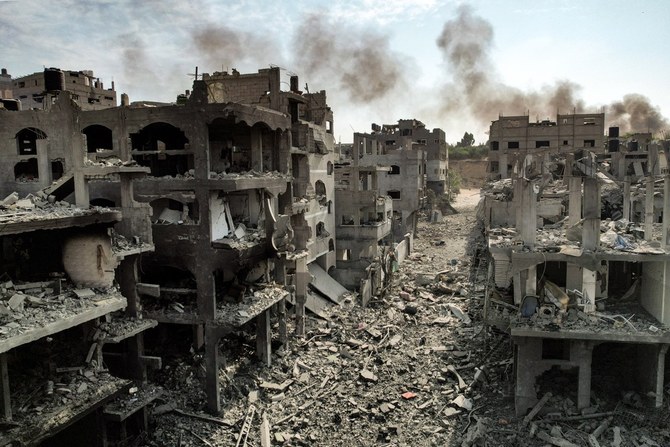
- Aid groups warn any invasion would add to already-catastrophic conditions for civilians
- Government spokesman says Israel ‘moving ahead’ with its operation to go after Hamas in Rafah
GAZA STRIP, Palestinian Territories: Palestinians on Thursday mourned over people killed in Israeli bombardment of Rafah, the southern Gaza city where Israel says it is advancing plans for a ground invasion.
Global concern has mounted over the looming operation against Hamas militants in Rafah, where much of Gaza’s population has sought refuge from more than six months of war in the narrow coastal strip.
Aid groups warn any invasion would add to already-catastrophic conditions for civilians.
Israeli officials have for more than two months vowed to enter Rafah, near the Egyptian border, but even before any ground operation the area has been regularly bombed, including overnight Wednesday-Thursday.
At the city’s Al-Najjar Hospital on Thursday, two men knelt in front of a white body bag in grief, among other mourners gathered at the site.
Elsewhere in the city, Palestinians tried to salvage belongings from the rubble of bombarded buildings.
Israeli government spokesman David Mencer said Israel was “moving ahead” with its operation to go after four Hamas battalions in Rafah.
“They will be attacked,” he said.
The war began with an unprecedented Hamas attack on October 7 that resulted in the deaths of about 1,170 people in Israel, according to an AFP tally of Israeli official figures.
Israel vowed to destroy Hamas, with a retaliatory offensive that has killed at least 34,305 people in Gaza, mostly women and children, according to the Hamas-run territory’s health ministry.
Thursday’s toll included at least 43 more deaths over the previous day.
During their attack militants seized hostages, 129 of whom Israel estimates remain in Gaza, a figure that includes 34 presumed dead.
Hamas on Wednesday released a video of an Israeli-American man who was one of those captured.
Also on Wednesday, US President Joe Biden signed a law authorizing $13 billion in additional military aid to close ally Israel.
Much of that funding is to support the country’s air defenses, which received an unprecedented test this month with Iran’s first-ever direct strike against its foe.
Iran fired more than 300 drones and missiles toward Israel, the Israeli military said, but most were shot down by that country and its allies.
The Iranian barrage followed what it said was a deadly Israeli strike against Tehran’s embassy consular annex in Syria.
The US legislation also included $1 billion in humanitarian aid for Gaza, with Biden demanding it reaches reach Palestinians “without delay.”
The United Nations has warned of imminent famine and “access constraints” on the delivery of humanitarian assistance.
Germany said it would resume cooperation with the main aid agency in Gaza, the UN’s agency for Palestine refugees, or UNRWA, after an independent review found Israel had not yet provided evidence for its allegations that its staff belonged to “terrorist” groups.
Regional tensions remain high as the Gaza war has led to violence between Israel and Iran’s proxies and allies.
Israel has struck increasingly deeper into Lebanon, while the Iran-backed Hezbollah movement has stepped up rocket fire and drone attacks on Israeli military bases across the border.
The violence has fueled fears of all-out conflict between Hezbollah and Israel, which last went to war in 2006.
On Thursday Lebanese state media and a Hezbollah source said one person was wounded in an Israeli drone attack on a fuel truck near Baalbek, the latest such incident away from the southern border.
In other regional fallout, US-led coalition forces shot down an anti-ship missile launched by Yemen’s Iran-backed Houthi rebels, American authorities said on Thursday.
The Israeli military on Thursday said its aircraft had struck more than 30 Hamas targets across Gaza over the previous day.
Witnesses reported clashes between militants and Israeli troops near the Nuseirat refugee camp in central Gaza, as the world’s attention is increasingly focused further south, on Rafah.
Netanyahu in early April gave no details but said “there is a date” for the Rafah operation, over which the United States and others have expressed grave concern because of the concentration of civilians there.
Citing Egyptian officials briefed on Israeli plans, The Wall Street Journal has said Israel was planning to move civilians to nearby Khan Yunis over a period of two to three weeks, before gradually sending in troops.
The hostage in the video released on Hamas’s official Telegram account identified himself as Hersh Goldberg-Polin, 23.
In the video, the authenticity of which AFP has not been able to independently verify, Goldberg-Polin was missing a hand, a wound he suffered during his capture.
In an apparent reference to Jewish Passover which began this week, Goldberg-Polin, likely speaking under duress, told Israeli government members that “while you sit and have holiday meals with your families, think of us, the hostages, who are still here in hell.”
Hostage supporters and anti-government demonstrators have intensified protests — including again on Wednesday night in Jerusalem — for the government to reach a deal that would free the captives, accusing Netanyahu of prolonging the war.
The European Union, the UN rights office and the White House have called for a probe into mass graves found at Gaza’s two biggest hospitals after Israeli raids.
“We want answers,” US National Security Adviser Jake Sullivan said on Wednesday. “We want to see this thoroughly and transparently investigated.”
Israel has repeatedly targeted hospitals during the war, accusing Hamas of using them as command centers and to hold hostages. Hamas denies the accusations.
Gaza’s Civil Defense agency said nearly 340 bodies were uncovered at Nasser Hospital in Khan Yunis city.
Israeli army spokesman Major Nadav Shoshani said on X that “the grave in question was dug — by Gazans — a few months ago.”
The Israeli army acknowledged that “corpses buried by Palestinians” had been examined by soldiers searching for hostages, but did not directly address allegations that Israeli troops were behind the killings.
Israel says it is poised to move on Rafah

- Israel has killed at least 34,183 people in Gaza, mostly women and children, according to Gaza health ministry
- Defense official said Israel had bought 40,000 tents to house Palestinians relocated from Rafah in advance of assault
JERUSALEM: Israel’s military is poised to evacuate Palestinian civilians from Rafah and assault Hamas hold-outs in the southern Gaza Strip city, a senior Israeli defense official said on Wednesday, despite international warnings of humanitarian catastrophe.
A spokesperson for Prime Minister Benjamin Netanyahu’s government said Israel was “moving ahead” with a ground operation, but gave no timeline.
The defense official said Israel’s Defense Ministry had bought 40,000 tents, each with the capacity for 10 to 12 people, to house Palestinians relocated from Rafah in advance of an assault.
Video circulating online appeared to show rows of square white tents going up in Khan Younis, a city some 5 km (3 miles) from Rafah. Reuters could not verify the video but reviewed images from satellite company Maxar Technologies which showed tent camps on Khan Younis land that had been vacant weeks ago.
An Israeli government source said Netanyahu’s war cabinet planned to meet in the coming two weeks to authorize civilian evacuations, expected to take around a month.
The defense official, who requested anonymity, told Reuters that the military could go into action immediately but was awaiting a green light from Netanyahu.
Rafah, which abuts the Egyptian border, is sheltering more than a million Palestinians who fled the half-year-old Israeli offensive through the rest of Gaza, and say the prospect of fleeing yet again is terrifying.
“I have to make a decision whether to leave Rafah because my mother and I are afraid an invasion could happen suddenly and we won’t get time to escape,” said Aya, 30, who has been living temporarily in the city with her family in a school.
She said that some families recently moved to a refugee camp in coastal Al-Mawasi, but their tents caught fire when tank shells landed nearby. “Where do we go?“
Hitting hard
Israel, which launched its war to annihilate Hamas after the Islamist group’s Oct. 7 attacks on Israeli towns, says Rafah is home to four Hamas combat battalions reinforced by thousands of retreating fighters, and it must defeat them to achieve victory.
“Hamas was hit hard in the northern sector. It was also hit hard in the center of the Strip. And soon it will be hit hard in Rafah, too,” Brig.-General Itzik Cohen, commander of Israel’s 162nd Division operating in Gaza, told Kan public TV.
But Israel’s closest ally Washington has called on it to set aside plans for an assault, and says Israel can combat Hamas fighters there by other means.
“We could not support a Rafah ground operation without an appropriate, credible, executable humanitarian plan precisely because of the complications for delivery of assistance,” David Satterfield, US special envoy for Middle East humanitarian issued, told reporters on Tuesday.
“We continue discussions with Israel on what we believe are alternate ways of addressing a challenge which we recognize, which is Hamas military present in Rafah.”
Egypt says it will not allow Gazans to be pushed across the border onto its territory. Cairo had warned Israel against moving on Rafah, which “would lead to massive human massacres, losses (and) widespread destruction,” its State Information Service said.
Israel has withdrawn most of its ground troops from southern Gaza this month but kept up air strikes and conducted raids into areas its troops abandoned. Efforts by the United States, Egypt and Qatar to broker an extended ceasefire in time to head off an assault on Rafah have so far failed.
Gaza medical officials say than 34,000 people have been killed in Israel’s military campaign, with thousands more bodies feared buried under rubble.
Hamas killed 1,200 people and abducted 253 on Oct 7, according to Israeli tallies. Of those hostages, 129 remain in Gaza, Israeli officials say. More than 260 Israeli troops have been killed in ground fighting since Oct 20, the military says.
H. A. Hellyer, a senior associate fellow in international security studies at the Royal United Services Institute, said he expected the assault on Rafah “sooner rather than later” because Netanyahu is under pressure to meet his stated objectives of rescuing hostages and killing all the Hamas leaders.
“The invasion of Rafah is unavoidable because of the way he has framed all of this,” he said. But it will not be possible for everyone to leave the city, so “if he sends the military into Rafah, there are going to be a lot of casualties.”
Turkiye offers Iraq technical help to bolster border security
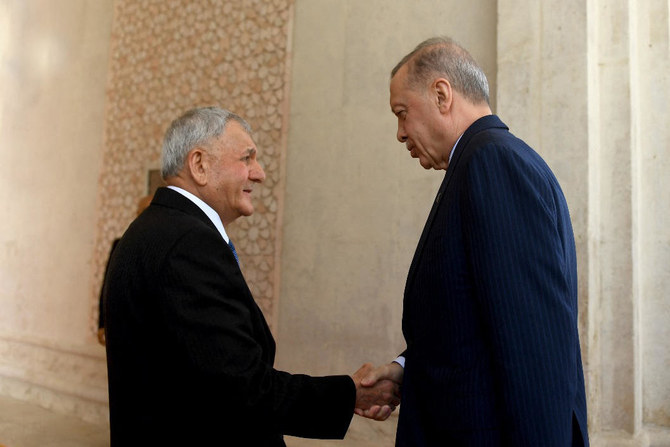
- A delegation from Iraq earlier visited Turkiye to examine the border security systems that Turkiye offered to provide
- Discussions for security cooperation still under way
ANKARA: Turkiye is in discussions with Iraq to provide technical assistance to Baghdad for securing its borders to prevent movements of outlawed Kurdistan Workers Party (PKK) militants around the region, a Turkish defense ministry official said on Thursday.
Turkish President Tayyip Erdogan visited Baghdad and Irbil this week as Ankara ramped up cross-border operations against PKK militants based in mountainous, mainly Kurdish northern Iraq.
The two countries agreed to a strategic framework agreement overseeing security, trade and energy as well as a defense cooperation deal during the visit.
“We told our counterparts that Turkiye is ready to provide assistance to Iraq on border security systems,” the Turkish official told reporters.
A delegation from Iraq earlier visited Turkiye to examine the border security systems that Turkiye offered to provide, the official also said, adding that the discussions for security cooperation were still under way.
During a joint press conference with Erdogan on Monday, Iraqi Prime Minister Mohammed Shia Al-Sudani said the two countries would cooperate to bolster border security, without mentioning the PKK specifically.
The PKK took up arms against the Turkish state in 1984 and is designated a terrorist organization by Ankara and its Western allies. Turkiye has conducted a series of cross-border operations against the group in northern Iraq since 2019.
US-led coalition in Red Sea downs Houthi anti-ship missile, four drones
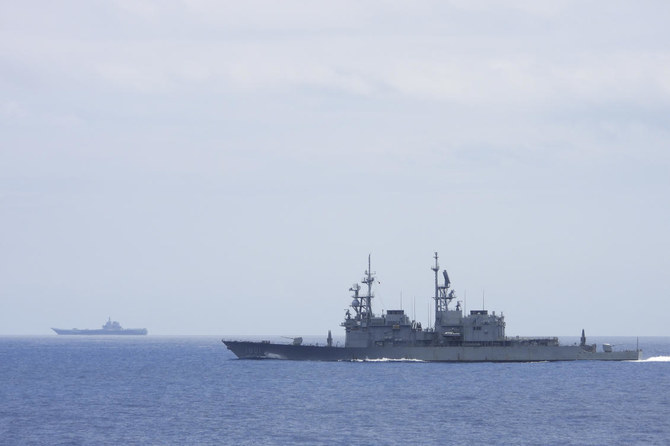
- CENTCOM: Missile was likely targeting the MV Yorktown, a US-flagged shipping vessel
- Greek frigate intercepts two drones launched toward a commercial ship
DUBAI: US-led coalition forces shot down four drones and an anti-ship missile launched by Yemen’s Houthi rebels, American authorities said Thursday, as the Iran-backed group announced strikes against US and Israeli ships.
A Greek vessel deployed in the Gulf of Aden as part of an EU naval coalition also shot down a drone off Yemen’s coast early on Thursday, the Greece general staff said in a statement.
The incidents follow a lull in attacks by the Houthis, who launched dozens of missile and drone strikes targeting shipping since November, saying they were acting in solidarity with Palestinians during the Israel-Hamas war.
Despite the drop in attacks in recent weeks, late on Wednesday the Houthis said they “are continuing to take further military actions against all hostile targets in the Red Sea, the Arabian Sea, and the Indian Ocean.”
US Central Command (CENTCOM) said in a statement on X, formerly Twitter, that just before noon Yemen time (0900 GMT) on Wednesday a coalition vessel “successfully engaged one anti-ship ballistic missile (ASBM)” launched from Houthi-controlled areas of the country.
April 24 Red Sea Update
— U.S. Central Command (@CENTCOM) April 24, 2024
At 11:51 a.m. (Sanaa time) on April 24, a coalition vessel successfully engaged one anti-ship ballistic missile (ASBM) launched from Iranian-backed Houthi terrorist-controlled areas in Yemen over the Gulf of Aden. The ASBM was likely targeting the MV… pic.twitter.com/MppinZTpTi
The missile was likely targeting the MV Yorktown, a US-flagged shipping vessel, CENTCOM said, adding there were no injuries or damage.
CENTCOM also said it had engaged and destroyed four drones launched by the Houthis shortly afterwards.
“It was determined that the ASBM and UAVs (drones) presented an imminent threat to US, coalition, and merchant vessels in the region,” CENTCOM said.
Houthi military spokesman Yahya Saree on Wednesday said that the rebels attacked US and Israeli ships, including the MV Yorktown which he claimed was hit, without providing evidence.
The Houthi rebels said they “carried out a military operation targeting the American ship (MV Yorktown) in the Gulf of Aden, with a number of suitable naval missiles, and the hit was accurate,” Saree said.
The group also “targeted an American warship destroyer in the Gulf of Aden with a number of drones, and in another operation, targeted an Israeli ship the (MSC Veracruz) in the Indian Ocean, with a number of drones,” he added, saying the operations “achieved their objectives.”
The Houthi attacks have drawn reprisal strikes from the United States and Britain as well as the deployment of Western naval forces to counter strikes on ships plying the busy commercial routes.
The Greek frigate Hydra, deployed to the Gulf of Aden in February, fired on two drones off the coast of Yemen on Thursday, shooting down one, Greek authorities said.
The Houthis, who control much of Yemen’s Red Sea coast, are part of an “axis of resistance” of Iran allies and proxies targeting Israel in protest at its war against Hamas in the Gaza Strip.



